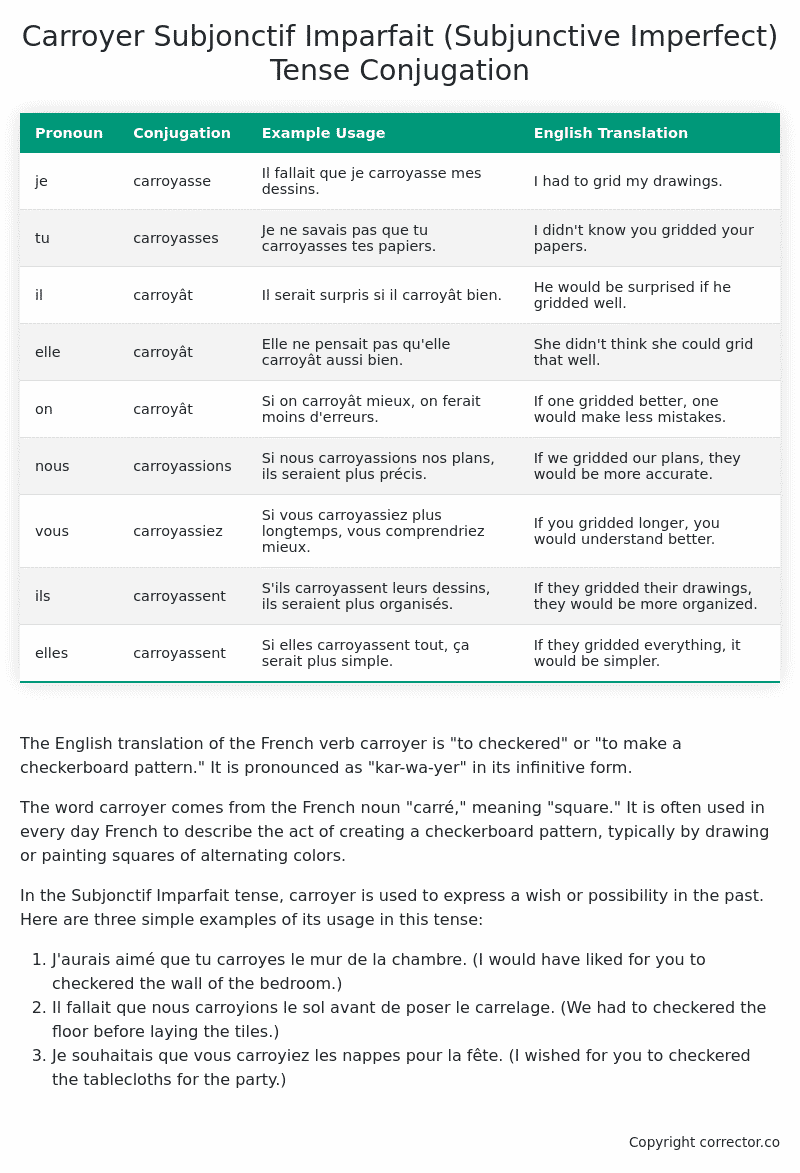Subjonctif Imparfait (Subjunctive Imperfect) Tense Conjugation of the French Verb carroyer
Introduction to the verb carroyer
The English translation of the French verb carroyer is “to checkered” or “to make a checkerboard pattern.” It is pronounced as “kar-wa-yer” in its infinitive form.
The word carroyer comes from the French noun “carré,” meaning “square.” It is often used in every day French to describe the act of creating a checkerboard pattern, typically by drawing or painting squares of alternating colors.
In the Subjonctif Imparfait tense, carroyer is used to express a wish or possibility in the past. Here are three simple examples of its usage in this tense:
- J’aurais aimé que tu carroyes le mur de la chambre. (I would have liked for you to checkered the wall of the bedroom.)
- Il fallait que nous carroyions le sol avant de poser le carrelage. (We had to checkered the floor before laying the tiles.)
- Je souhaitais que vous carroyiez les nappes pour la fête. (I wished for you to checkered the tablecloths for the party.)
Table of the Subjonctif Imparfait (Subjunctive Imperfect) Tense Conjugation of carroyer
| Pronoun | Conjugation | Example Usage | English Translation |
|---|---|---|---|
| je | carroyasse | Il fallait que je carroyasse mes dessins. | I had to grid my drawings. |
| tu | carroyasses | Je ne savais pas que tu carroyasses tes papiers. | I didn’t know you gridded your papers. |
| il | carroyât | Il serait surpris si il carroyât bien. | He would be surprised if he gridded well. |
| elle | carroyât | Elle ne pensait pas qu’elle carroyât aussi bien. | She didn’t think she could grid that well. |
| on | carroyât | Si on carroyât mieux, on ferait moins d’erreurs. | If one gridded better, one would make less mistakes. |
| nous | carroyassions | Si nous carroyassions nos plans, ils seraient plus précis. | If we gridded our plans, they would be more accurate. |
| vous | carroyassiez | Si vous carroyassiez plus longtemps, vous comprendriez mieux. | If you gridded longer, you would understand better. |
| ils | carroyassent | S’ils carroyassent leurs dessins, ils seraient plus organisés. | If they gridded their drawings, they would be more organized. |
| elles | carroyassent | Si elles carroyassent tout, ça serait plus simple. | If they gridded everything, it would be simpler. |
Other Conjugations for Carroyer.
Le Present (Present Tense) Conjugation of the French Verb carroyer
Imparfait (Imperfect) Tense Conjugation of the French Verb carroyer
Passé Simple (Simple Past) Tense Conjugation of the French Verb carroyer
Passé Composé (Present Perfect) Tense Conjugation of the French Verb carroyer
Futur Simple (Simple Future) Tense Conjugation of the French Verb carroyer
Futur Proche (Near Future) Tense Conjugation of the French Verb carroyer
Plus-que-parfait (Pluperfect) Tense Conjugation of the French Verb carroyer
Passé Antérieur (Past Anterior) Tense Conjugation of the French Verb carroyer
Futur Antérieur (Future Anterior) Tense Conjugation of the French Verb carroyer
Subjonctif Présent (Subjunctive Present) Tense Conjugation of the French Verb carroyer
Subjonctif Passé (Subjunctive Past) Tense Conjugation of the French Verb carroyer
Subjonctif Imparfait (Subjunctive Imperfect) Tense Conjugation of the French Verb carroyer (this article)
Subjonctif Plus-que-parfait (Subjunctive Pluperfect) Tense Conjugation of the French Verb carroyer
Conditionnel Présent (Conditional Present) Tense Conjugation of the French Verb carroyer
Conditionnel Passé (Conditional Past) Tense Conjugation of the French Verb carroyer
L’impératif Présent (Imperative Present) Tense Conjugation of the French Verb carroyer
L’infinitif Présent (Infinitive Present) Tense Conjugation of the French Verb carroyer
Struggling with French verbs or the language in general? Why not use our free French Grammar Checker – no registration required!
Get a FREE Download Study Sheet of this Conjugation 🔥
Simply right click the image below, click “save image” and get your free reference for the carroyer Subjonctif Imparfait tense conjugation!

Carroyer – About the French Subjonctif Imparfait (Subjunctive Imperfect) Tense
Formation
Common Everyday Usage Patterns
Interactions with Other Tenses
Subjonctif Présent
Indicatif Passé Composé
Conditional
Conditional Perfect
Summary
I hope you enjoyed this article on the verb carroyer. Still in a learning mood? Check out another TOTALLY random French verb conjugation!


